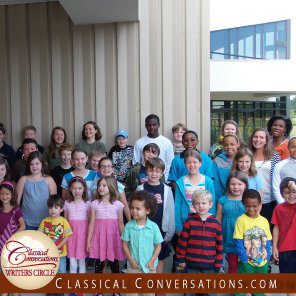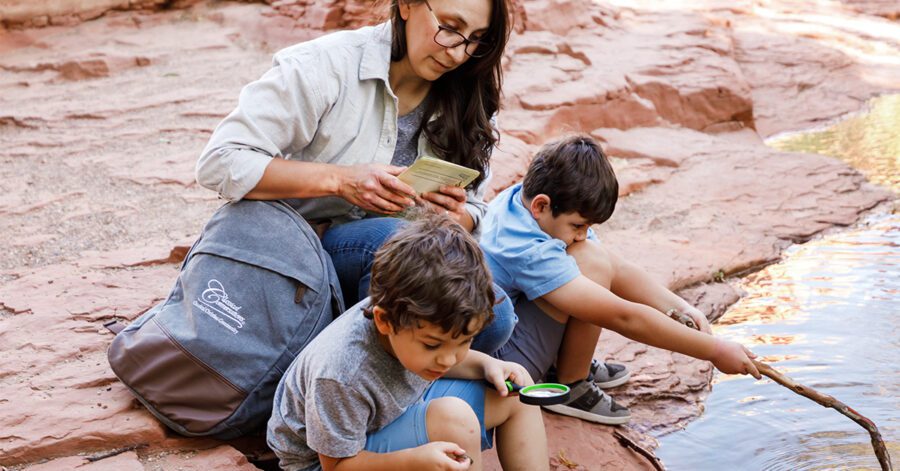Think about community. The word “community” comes from the Old French word communité, which, as you Latin students know, is derived from communitas (cum, “with/together,” plus munus, “gift”). In short, community is the gift of being together with others. This statement raises a couple of questions: Do we see the communities in which we live and participate as gifts of being together? Do we see the Classical Conversations communities, of which we are a part, as gifts?
My guess is that the answers to these questions are a mixed bag. Probably, most Classical Conversations communities are wonderful and encouraging, some are not, and a few are in between. All communities will be a mix of good and bad, of warmth and camaraderie, along with the difficult stuff that arises because we are sinners. Perhaps, though, it is precisely in the difficulty of participating in community that we find a blessing. Should we see our individual Classical Conversations communities as something more than a convenient, classical education, homeschooling resource, and weekly social gathering? I want to suggest that beyond timelines and Latin, beyond grammar and world maps, our communities offer social connections in which we are challenged by the greatest classical lesson of all, to be genuine followers of Christ.
This is a rather heady claim, but let us consider what communities are all about and why God would put us in them. However, I must pause and say that I am interested in community because I “do” community so poorly. My wife is so much better than I at “doing” community. I am exploring the idea of community so that I might enter into community better than I do now.
What is the purpose of community?
We all live in multiple communities. We have our families, our neighborhoods, our churches, our friends, and even our Facebook “friends.” Some communities are good and healthy, others are not. Some communities are places where we feel most at home. Others are more difficult. And sometimes we wonder why Christian communities are not always friendlier or more supportive than some non-Christian communities. Yet we seek communities and community all the time. There seems to be something deep within us that wants and needs genuine community. As much as we might want to think of ourselves as individuals, as islands, we keep coming back to community. Why?
We bear the image of God and, therefore, like God we are personal and uniquely relational. As Christians we look forward to the kingdom of God finally being established; a kingdom in which we will live and thrive in the ultimate community, free from sin and suffering, free from the ills that plague our communities today. Clearly, we are made to be in community.
To be in community is to be in relationships, and relationships are the “arena” in which God teaches us the truth of His love, the truth of ourselves, and the true value of such things as mercy, forbearance, forgiveness, grace, excellence of character, and virtue. In community this teaching becomes visceral and tangible rather than merely hypothetical. Many creatures live in, and need to be in, relationship with each other and other creatures, but human beings enter into relationships and community differently. This is because we are moral beings. We are made in the image of God, which means we are persons. God gave to us the need for and the ability to engage in community as a gift, not because being in community is always easy or enjoyable, but because there is a kind of richness in that type of human relationship in which we grow in our sanctification. A community is, in many ways, a mysterious web of obligations that holds us accountable, that calls for our participation, and that both supports and challenges our individuality. Among the various benefits of community is that it helps keep us honest about our failings and our sin. Community helps us grow up.
How is Classical Conversations a community?
If you participate in a local Classical Conversations group then you are part of that community. You are a member regardless of how involved or on the fringes you are. However, there is more to being in community and more to what makes your group a community, than merely what happens by default when a group of people get together. Communities are, in a sense, living beings. They come together, grow, flourish, and fail much the same way as other organic beings. But more than merely being the product of some kind of DNA or natural forces, human communities are the tangible results of choices made out of our free will. Your Classical Conversations community is the same. It will be a good community if the people involved make wise and loving choices to create and foster that community. I realize this is obvious.
I think it is critical that we do not get too technical in defining “community.” Let us just say that a community is a group of people who are linked in some way by some commonalities such as similar goals, ideas, language, experiences, and so on. And let us say that though proximity is often an important element, it is not always necessary. And let us also say that communities are living things such that communities require active participation by their members. Now, all of this does not mean a community is a tight-knit group nor does it mean that all communities have members with identical goals, and it certainly does not mean there are clear boundaries demarcating what is in and what is out. In short, we generally know a community when we see one, but we will fumble a bit trying to clearly define its specific characteristics.
A Christian community (big or small), whether a church or music team, a Bible study or group of friends, a business or book club, a sports team or a theology nerd pottery club, has an additional characteristic: Christians are called to love each other with the same love that Christ shows us. We are to seek what is best for each other, to take up our cross daily, to “put on Christ,” and be servants. Consider what Saint Paul wrote to the community of Christians struggling through life in fear and trembling in first century Colossae, “Therefore, as God’s chosen people, holy and dearly loved, clothe yourselves with compassion, kindness, humility, gentleness and patience.” (Colossians3:12; NIV 1984.) If we are part of a Christian community then we should make compassion, kindness, humility, gentleness and patience our underlying virtues. If we are actively participating in a Classical Conversations community then we must realize that these virtues are more important than our timelines and Latin, or our grammar and world maps, and even more important than the curriculum itself.
However, any Classical Conversations community also has a fundamental educational basis that makes it unique. And, perhaps, sharing in the struggle of a Christian Classical education brings challenges one does not find in most other places. If we are to understand education as being, in the words of Andrew Kern, “the cultivation of wisdom and virtue by nourishing the soul on truth, goodness, and beauty so that the student is better able to know and enjoy God,” then we really have our hands full. If we want to know the boundaries of a Classical Conversations community, then this fundamental educational basis is a pretty good place to start. For while we struggle with the virtues of compassion, kindness, humility, gentleness and patience, we do so in the specific context of meeting once a week with our fellow community members, of guiding our children (and sometimes other children) through the curriculum, then taking that curriculum home, and sometimes interacting with other Classical Conversations families at various times throughout the week. All the while we are cultivating wisdom and virtue by nourishing our children’s souls on truth, goodness, and beauty so that they are better able to know and enjoy God.
We will, however, frequently fail. Perhaps not catastrophically, but in many little ways we will not reach our goals. At times, we will even hurt each other. We are finite and limited, sure, but more importantly, we are sinners. We will find ourselves all too frequently doing the things we know we should not do, and not doing the things we know we should. At that point, a Classical Conversations community has the opportunity to be a gift beyond even the natural and wonderful gift of a classical education. It is at that point that we have no choice but to turn to God and to encourage each other in the way of Christ. God, in whom we live and move and have our being, and His Christ, who is the perfect image of God to us, should be at the center of every Classical Conversations community. The great irony of the Christian life is that in and through our failures comes our sanctification and our true hope. Community is one way God makes this happen. Truly, this is a gift.




